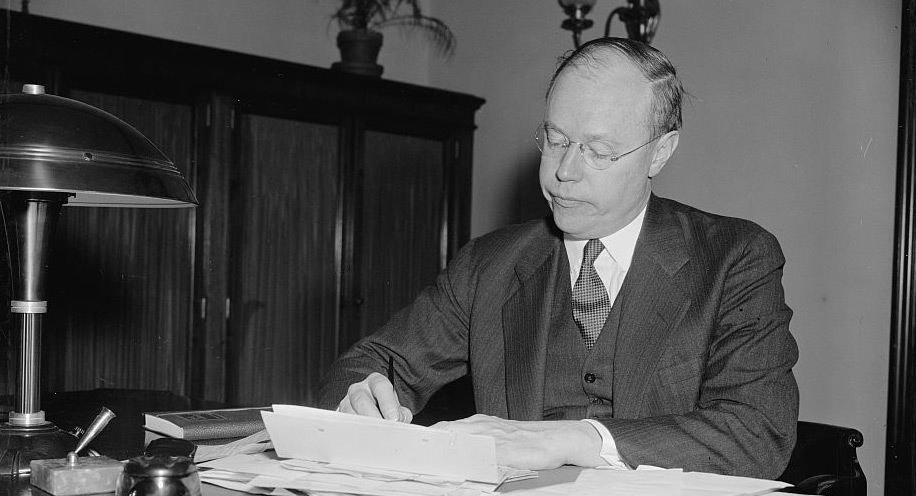Middle Americans are in a fix. The federal bureaucracy, the media, and the academy, all dominated by the left wing, seem to view many of them as hopeless rubes in need of radical reeducation. The best case for Donald Trump was that he attempted to give Middle America a voice in Washington. But he blundered because of a fatal narcissism that could run against the guardrails of our republican politics (as on January 6), and because of an insufficient commitment to a true America First agenda, as was shown in many of his choices of policy and personnel (such as his reliance on inane family members to steer his administration).
With the acquittal in his second impeachment trial, Trump will likely try to reclaim the role of Middle America’s champion. But in the face of a woke revolution and a possible Green New Deal, its denizens deserve something better. Oh, that we could resurrect the great and forgotten senator from Ohio, Robert A. Taft.
Robert Alfonso Taft was born on September 8, 1889, the eldest son of William Howard Taft, the 27th president and the tenth chief justice of the United States. Taft would have been content with a life in Ohio, but he perceived the revolution that was underway in American government: the New Deal.
“Many of the New Dealers,” Taft charged, “have no concern whatever for individual freedom. They are collectivists like Marx and Lenin and Mussolini” and believe “that the Government should regulate every detail of industrial and commercial and agricultural life.” Taft urged Republicans to oppose all measures inimical to “preserving, maintaining, and increasing the liberty of the people of our country.”
The New Deal led to the formation of the Old Right, a collection of diverse personalities united in opposition to central planning and an interventionist foreign policy. Taft became the leader of the Old Right’s political wing when Ohioans elected him to the U.S. Senate in 1938. He was exactly what the rudderless Republican minority needed.
Taft disdained Franklin Delano Roosevelt’s penchant for creating new federal agencies, but he also worried about New Dealers’ inclination to intervene in international conflicts. In the words of Russell Kirk and James McClellan, Taft’s foreign policy was influenced “by two prejudices (using that word in its neutral sense): his prejudice in favor of peace, and his prejudice against empire.” The benefit of hindsight has placed a moral blemish on those who had been skeptical of entering the Second World War. But Taft was no thoughtless isolationist. His reasons are worth understanding. Kirk and McClellan describe his mindset: “For the United States, then, war was preferable to conquest or to economic ruin; but if these calamities were not in prospect, America should remain aloof.” He was, moreover, willing to change his mind as circumstances did. Indeed, in the days after Pearl Harbor, Taft voted to declare war against Japan, Germany, and Italy. But after the victory, Taft saw that too many Americans relished a perpetual involvement in matters disconnected from the national interest. He rightly worried about the future of American foreign policy.
Taft sought the Republican presidential nomination on three occasions. Each time, the liberal wing of the party, led by Thomas E. Dewey, preferred a candidate who would present himself as a better administrator of the New Deal machinery rather than as a dismantler of its would-be Soviet bureaucracy. It appeared Taft would finally get his chance in 1952. But Dewey and the East Coast establishment recruited General Dwight D. Eisenhower as their nominee. Even a man widely known as “Mr. Republican” had little chance to defeat the popular war hero, who won the party’s nomination and then crushed Democrat Adlai Stevenson in the general election.
Had he secured the nomination and won the presidency, Taft would not have been long at the helm. He died of cancer on July 31, 1953. Four years later, a Senate committee named Taft as one of America’s five greatest senators, along with Henry Clay, Daniel Webster, John C. Calhoun, and Robert M. La Follette Sr.
The American political environment in 2021 is not so different from that in 1938, when Taft entered the Senate. Heedless of its narrow majorities, the Democratic Party feels ascendant and is advocating serious changes to our constitutional framework (if not in some respects its outright abolition). With Trump’s second impeachment trial over, the Left hopes to enact a Green New Deal and to push racial preferences under the guise of “equity.” Republican leadership is inept and content to adopt policy positions that the Democrats have abandoned as they march farther to the left. Hawks in both parties were perturbed that Trump avoided war with Iran and actually brought some American forces home. The interventionist impulse is strong. It’s likely that American soldiers will be sent on another fool’s errand before President Biden’s first term expires.
Middle America needs a Robert A. Taft—not a bully from Queens or a modern version of Thomas Dewey. Will no statesman arise to fill Mr. Republican’s shoes?












